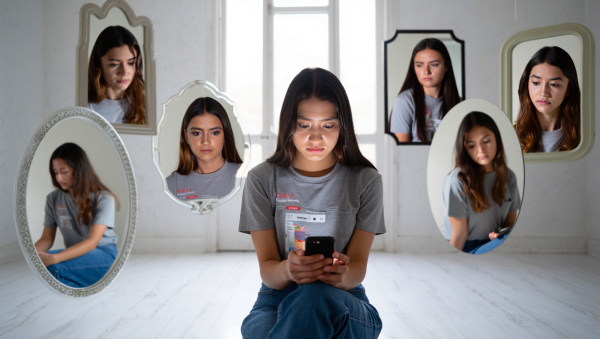The Comparison Trap: Social Media and Your Self-Worth
You open Instagram for a quick scroll and twenty minutes later close it feeling somehow less than – less successful, less attractive, less happy than the carefully curated lives filling your feed. It happens so subtly you might not even notice. But that feeling of inadequacy? It’s real, and it has a name: the comparison trap.
At Televero Health, we work with many people whose sense of self-worth has been significantly impacted by constant exposure to idealized representations of others’ lives through social media. They come to us feeling perpetually insufficient despite objective evidence of their own achievements, strengths, and value. What they discover is that comparing their unfiltered reality to others’ highlight reels creates a game that’s impossible to win – a game that can gradually erode self-esteem, increase anxiety, and contribute to depression.
Maybe you recognize this pattern in your own experience. Maybe you find yourself making automatic comparisons between your life and what you see online. Maybe you feel a pang of envy when you see others’ achievements, possessions, or experiences showcased with perfect lighting and thoughtful captions. Maybe you intellectually know that social media presents a highly selective version of reality, yet still find yourself emotionally affected by these curated glimpses into others’ lives.
This response isn’t a sign of weakness or insecurity. It reflects how powerfully social comparison is wired into human psychology, combined with the unprecedented scale and intensity of comparison opportunities that social media provides. Throughout human history, we evaluated our standing primarily within small, local groups where we could see the full, messy reality of others’ lives. Now we compare ourselves to hundreds or thousands of partially visible lives, each carefully edited to emphasize the most impressive, enviable moments.
This creates a uniquely challenging psychological environment. When you see only the highlights of many different lives – one person’s professional success, another’s perfect relationship, someone else’s physical fitness – you’re not comparing yourself to any single realistic life. You’re comparing yourself to a composite ideal that no actual human being achieves across all domains. It’s a standard that feels normal because you see elements of it every day, yet is actually impossible to reach because it combines the peak moments from countless different lives.
The impact of this constant upward comparison can be profound. It can create a persistent sense of deficiency – a feeling that no matter what you achieve or how you live, it’s never quite enough. It can generate anxiety about how your own life appears to others, leading to performative behaviors driven more by how they’ll be perceived than by genuine satisfaction. It can decrease appreciation for your actual experiences, as moments become valuable primarily as content rather than for their inherent meaning or joy.
We see these effects manifest in many ways. The client who can’t enjoy their own accomplishments because they seem insignificant compared to what others are showcasing. The person who feels perpetually behind in life despite meeting personal goals they once considered meaningful. The individual who spends significant time and energy crafting an online presence that suggests a life they don’t actually feel they’re living. The young adult who bases major life decisions not on personal values or circumstances, but on what will appear successful or enviable to their digital audience.
These patterns aren’t just uncomfortable; they can actively undermine wellbeing. Research consistently links heavy social media use to increased rates of anxiety, depression, and diminished self-esteem, with social comparison appearing as a key mechanism in this relationship. The more time people spend comparing themselves to others online, the worse they tend to feel about themselves and their lives.
If you’ve found yourself caught in this comparison trap, know that shifting your relationship with social media isn’t just about willpower or going cold turkey. It’s about developing a more conscious, intentional approach to these platforms and the way you relate to what you see on them.
In therapy, we help people develop this more balanced relationship in several ways. First, by becoming more aware of automatic comparison thoughts and the feelings they trigger. Then, by questioning the validity and helpfulness of these comparisons – recognizing how selective and incomplete the information is that drives them. Finally, by creating healthier boundaries and practices around social media use that protect self-worth while still allowing for meaningful connection.
These boundaries might include limiting time on platforms that trigger the most comparison. Or curating feeds to include more diverse and realistic content. Or practicing intentional gratitude for aspects of your own life that don’t make it into social media posts. Or periodically taking breaks from social media altogether to reset your perspective.
What we’ve found is that most people don’t need to eliminate social media entirely to reduce its negative impact. They just need to engage with it more consciously – to remember that what they’re seeing represents a highly selective version of reality, to notice when comparison is happening and gently redirect their attention, to ensure that their sense of self and worth remains grounded in their actual lived experience rather than how that experience compares to others’ digital personas.
Because the truth is, your value has never been determined by how your life stacks up against anyone else’s – especially not against the carefully curated snapshots that make up social media feeds. Your worth exists independent of likes, followers, or how your experiences would photograph. And reclaiming that intrinsic sense of value isn’t about rejecting connection in a digital age – it’s about engaging with these platforms in ways that supplement rather than supplant your authentic sense of self.
Ready to free yourself from the comparison trap? Start here.
